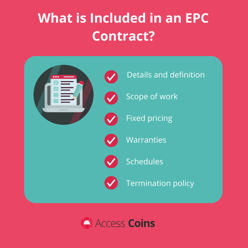What is an EPC Contract in Construction? Meaning, Advantages and Disadvantages
An EPC contract is a contract between a construction contractor and a project owner that covers the entire scope of a construction project. EPC contracts cover the engineering, procurement, and construction phases of a project.
EPC contracts are important to ensure complex, large-scale projects move forward and are completed efficiently.
This article covers different types of industries that use EPC contracts, the difference between a general contractor and an EPC contractor, and the advantages and disadvantages of an EPC contract.
Contents
- What is an EPC Contract and an EPC Contractor in Construction?
- EPC Contracts in Construction: Key Takeaways
- Why are EPC Contracts and Contractors Important in Construction?
- EPC Contractors vs General Contractors – What's the Difference?
- What is Included in an EPC Contract?
- What are the Advantages of an EPC Contract?
- What are the Disadvantages of an EPC Contract?
What is an EPC Contract and an EPC Contractor in Construction?
An EPC contract in construction is a formal contract agreement between the project owner and contractor covering the entire scope of the construction project from start to finish.
EPC stands for Engineering, Procurement, and Construction. EPC contracts are commonly used in large-scale construction projects with many moving pieces and team members. EPC contracts cover the project's design for engineers, procurement of the materials that need to be purchased and used for the project, and the actual construction that needs to be completed.
An EPC contractor in construction is the company that handles EPC contracts and delivers a project from start to finish. The EPC contractor has an important role in ensuring a project is well-managed and completed on time and within budget.
The goal of having an EPC contractor is to simplify the entire construction project process. This offers project owners a single entity to hold accountable for the entire project and prevents them from needing to manage different teams or project phases.
EPC contracts are divided into three main categories, which provide direction to the three roles and responsibilities within a construction project.
Engineering
In the engineering phase of an EPC contract, engineers craft a comprehensive engineering plan that includes civil, electrical, and mechanical engineering. The engineering phase should address local and national code and building regulations and all the technical aspects of the construction project, such as its structural, architectural, and functional components.
This phase also includes project design work, site planning and investigation, and detailed engineering plans to ensure everything is planned properly with technical specifications for the project to move towards the next phase.
Procurement
In the procurement phase of an EPC contract, the contractor sources and purchases all the materials necessary for the construction project to begin. This includes equipment such as excavators or bulldozers, supplies, and any services that may be needed for the project.
Another key area during the procurement phase is hiring subcontractors to perform specific functions. This is where an RFP will be collected from potential subcontractor partners.
The procurement phase involves connecting with suppliers, sourcing specific materials and negotiating on pricing, receiving the materials and goods, managing supply chains, and invoicing. All these activities are intended to keep the construction project moving forward and meeting the project standards and budget.
Construction
In the construction phase of an EPC contract, all the plans from the engineering phase are executed. This is the physical building phase. The EPC contractor is responsible for assembling and constructing the project according to the plan drawn up during the engineering phase.
An EPC contractor will manage the labor, construction scheduling and ensure safety and quality standards are met during the construction phase. The phase will include everything from electrical installation to plumbing, sanitation and draining, and the EPC contractor will ensure that the project is complete.
It is important for an EPC contractor to communicate with all the teams involved in the project, such as vendors, partners, and subcontractors, in this phase so the project doesn't deal with delays.

EPC Contracts in Construction: Key Takeaways
- An EPC contract in construction is a contract between the project owner and contractor that details the entire scope of the project.
- EPC contracts cover the engineering, procurement, and construction of a project.
- EPC contracts are important because a construction project is managed by one entity (EPC contractor) and is a detailed step-by-step plan for keeping the project moving forward to completion.
- An EPC contract has several advantages, such as streamlined project management, a fixed price and schedule, and quality assurance over the project.
- Some disadvantages to an EPC contract include limited owner control, complex contract negotiations, limited flexibility, and high cost estimates.
Access Coins ERP is built for construction
Gain the competitive edge with a powerful end-to-end platform built for construction management.
Why are EPC Contracts and Contractors Important in Construction?
EPC Contracts and contractors are important in construction because both play a role in ensuring that large-scale and complex construction projects are completed to the highest standard possible. EPC contractors ensure all the moving pieces of a complex construction project move forward efficiently.
Industries that use EPC contracts and EPC contractors range from the oil and gas industry to power and energy, large city infrastructures, the healthcare industry, and pretty much any industry that is in need of a large-scale construction project.
Oil and gas industries commonly use EPC contracts and contractors for all three components (upstream, midstream, and downstream). Examples include offshore drilling platforms, storage tanks, pipelines, and oil refineries.
Another industry that uses EPC contracts and contractors is city infrastructure construction projects, such as bridges or overpasses, subway systems, or utility systems such as water drainage.
EPC contracts are important to these types of construction projects because they are complex and have almost zero room for errors due to how the project will be used by the public. EPC contractors manage all three phases, ensuring each phase moves the project forward and is completed successfully.
EPC Contractors vs General Contractors – What's the Difference?
The difference between an EPC contractor and a general contractor is that EPC contractors manage the entire construction project from start to finish, while a general contractor manages only the construction phase of a project.
When an EPC contract is involved, the EPC contractor is responsible for the entire project, while a general contractor is only responsible for the construction site and coordinating subcontractors on the site.
General contractors work on smaller-scale projects such as commercial construction sites, office buildings, shopping centers, or residential projects. EPC contractors work on complex, large-scale projects that require multiple teams to coordinate.

What is Included in an EPC Contract?
An EPC contract should include the entire scope of a construction project for the project owner, including the engineering, procurement, and construction details, schedules and deadlines, and contractual terms such as payment, warranties, risk management, and guarantees.
Details and Definition
An EPC contract should include clear details and definitions of the construction project and a summary of the scope of work that is to be completed.
This section should include detailed specifications and responsibilities that the EPC contractor will handle. It should also describe the goal of the construction project and the estimated timeline from start to finish.
Scope of Work
An EPC contract should also include the entire scope of work, including the engineering, procurement, and construction phases. An EPC contract should go further into each phase with details on what is needed to complete the project and the next steps to ensure the project is moving forward according to schedule.
Fixed Pricing
An EPC contract should also include the project price and all the payment terms between the EPC contractor and the project owner. Financial predictability is what makes an EPC contract appealing to project owners. An EPC contract should include a fixed price that is set up within the contract in advance.
Warranties and Guarantees
Any warranties and guarantees made by the EPC contractor should be included in the EPC contract to communicate to the project owner what are their responsibilities and final project guarantees.
Schedules
Project schedules and timelines should be included in an EPC contract. This should be written in detail to ensure which phase of the project is taking place. This should also be clear for project owners to understand the timeline of the project and when it will be completed.
Termination Policy
A termination policy is an essential piece of an EPC contract and should be included to lay out exactly under what circumstances should an EPC contract be terminated by either party.
What are the Advantages of an EPC Contract?
An EPC contract offers several important advantages for project owners and contractors, especially if the project is large and complex.
Streamline Project Management
Under an EPC contract, all phases of a construction project are managed by one single entity. This streamlines the project management aspect and improves communication by managing the engineering, procurement, and construction phases under one roof.
Simplified project management reduces the potential for miscommunication and delays.
Having one point of contact leads to smoother project coordination, and the contractor can increase production with fewer risks.
Expertise
One key advantage of an EPC contract is that EPC contractors bring a wealth of specialized expertise and knowledge to a construction project. Often, EPC contractors already know where to source materials and goods or where to find specific subcontractors. EPC contractors have experience managing complex projects, which allows them to optimize their resources and time.
Quality Assurance throughout the Project
EPC contractors assure consistent quality assurance throughout the project duration. The EPC contractor is incentivized to deliver a high-quality result because they are accountable for the final project. An EPC contract often includes performance guarantees and provides the project owners peace of mind that the project will be operable when completed.
Project Fixed Price and Schedule
Another key advantage to EPC contracts is the fixed price and schedule included in the contract. EPC contracts set a fixed price agreement, which means all the project costs are set up in advance. A fixed price allows for financial predictability for the project owner and helps avoid the risks of unexpected costs, especially when dealing with subcontractors in the procurement phase.
EPC contracts also set a fixed schedule to ensure the construction project is completed within a specific timeframe. The EPC contractor is responsible for any project delays.
What are the Disadvantages of an EPC Contract?
While there are many advantages to having an EPC contract, there are also disadvantages that can be unappealing to construction project owners.
High Initial Cost Estimates
One upfront disadvantage to project owners in implementing an EPC contract is the initial high-cost estimates. The risk of overpricing may also be unattractive to project owners with limited budgets.
This is due to EPC contractors taking on the full responsibility of the project and the need for a high contract fee to cover any risks or issues that can happen during a construction project.
Limited Flexibility
Another disadvantage of an EPC contract is the limited flexibility for project changes. EPC contracts go through phases with fixed pricing and meticulous details to ensure the project is completed on-time and within budget. This makes changes to EPC contracts difficult and expensive after a phase has been completed and approved.
Any alterations to the design, scope, or timeline can result in high additional costs due to renegotiations with subcontractors and disruptions in the project.
Complex Negotiations
Because there are so many moving pieces and different teams involved during the engineering, procurement, and construction phases, EPC contracts can be complex and require detailed negotiation to ensure that both the project owner and EPC contractor agree on all terms.
Limited Owner Control
With an EPC contract, the owner's direct involvement during the construction phase is reduced. EPC contracts involve the contractor taking full control of the project, meaning the owner has less direct involvement in the day-to-day decision-making process. EPC contracts limit the owner's control, which could be a disadvantage for owners who want a more direct process from start to finish.






